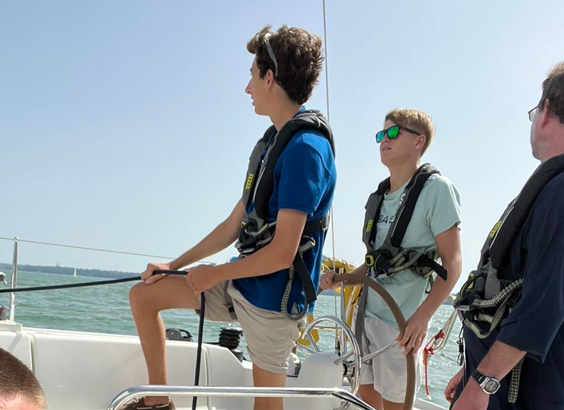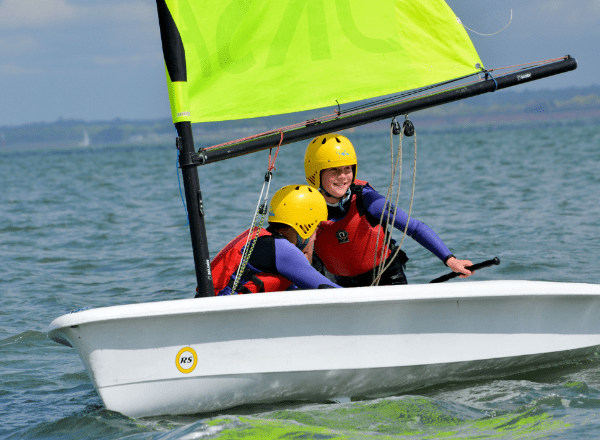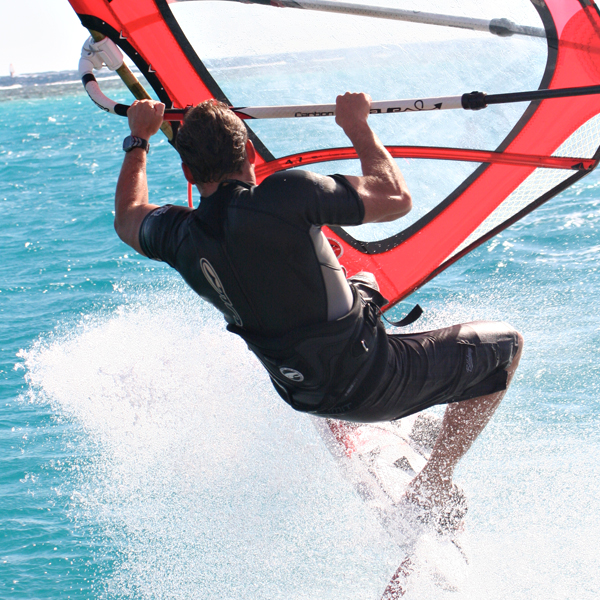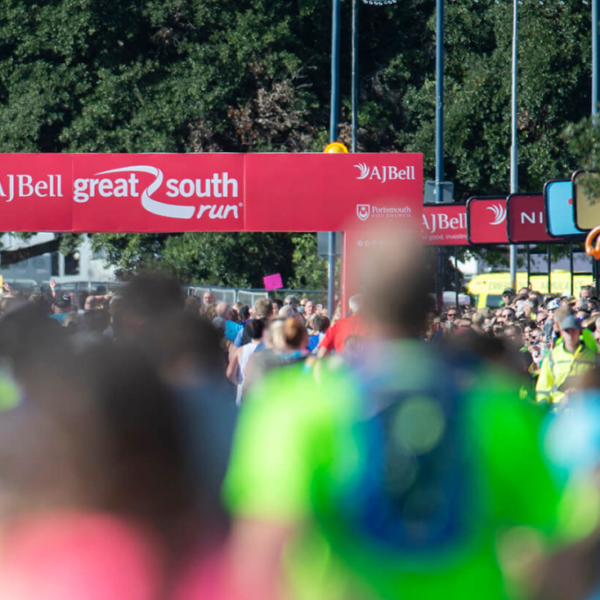How Long Does It Take to Learn to Sail?
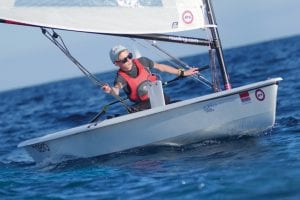
Learning to sail is a thrilling adventure that opens up a world of possibilities on the water. But how long does it take to learn to sail? The answer isn’t as straightforward as one might hope. It depends on several factors, including the type of sailing you wish to pursue, the time you can dedicate to learning, and your overall commitment to mastering this timeless skill. Whether you’re a complete novice or someone with a bit of boating experience, this guide will break down everything you need to know about the timeline and the journey of learning to sail.
Factors That Can Affect How Long It Takes to Learn How to Sail
It’s important to realise that everyone learns to sail at a different pace, so it’s important to know how long it takes to feel comfortable on the sea. These are a few important variables that may affect your learning curve.
Your Starting Point
If you’ve never set foot on a boat before, your learning process will naturally take longer than someone who has experience in water sports or boating. Understanding the basics, like wind direction, knot-tying, and steering, is crucial, and mastering these fundamentals can take a few weeks of dedicated practice.
The Type of Sailing
Another factor is the type of sailing you are interested in. For example, learning to sail a tiny dinghy takes less time than learning to sail a huge yacht. Dinghies can speed up learning because they are more responsive and offer quick feedback. However, it takes more time to learn the subtleties of larger vessels and the skills necessary to handle them properly when beginning to sail a yacht or keelboat.
Frequency of Practice
Practice makes perfect, as they say, and sailing is no exception. If you can commit to regular practice sessions, you’ll learn much faster. A weekend sailor who hits the water once a month will take considerably longer to become proficient than someone who can practice several times a week.

Instruction Quality
Another important consideration is the quality of instruction. Acquiring sailing knowledge from a knowledgeable and proficient instructor can significantly reduce the time required to learn the craft. Structured courses, such as the ones we deliver at UKSA, offer a thorough education covering all the necessary skills in an efficient and methodical manner.
Weather Conditions
The weather can be both a friend and a foe when learning to sail. Mild conditions are ideal for beginners, allowing you to get a feel for the boat without the added challenge of high winds or rough seas. However, learning to sail in a variety of conditions is essential to becoming a competent sailor. The more diverse the weather you experience during your training, the more well-rounded your skills will be.
Qualifications and Experience
For those wondering how long does it take to learn to sail from a qualifications standpoint, the answer depends on your goals. If you’re looking to gain official certifications, such as the RYA (Royal Yachting Association) qualifications, the timeline can vary.
RYA Start Yachting
Our RYA Start Yachting course is a great introduction to sailing and typically takes two days. By the end of this course, you should have a basic understanding of sailing and be able to steer the boat, handle sails, and be familiar with essential knots.
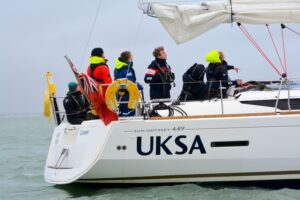
RYA Competent Crew
For those who wish to take their skills further, our RYA Competent Crew course is an excellent next step. This course usually takes five days and is designed to teach you how to be a useful crew member on a sailing yacht. After completing this course, you’ll have a solid foundation in sailing, including an understanding of navigation, mooring, and handling the boat in various conditions.
RYA Day Skipper
If you aim to skipper your own yacht, our RYA Day Skipper course is your next stop. This course is more intensive and typically takes five to seven days. It combines both theory and practical experience, covering navigation, seamanship, and the responsibilities of a skipper. Completing this course means you’ll be qualified to skipper a small yacht in familiar waters during daylight hours. You can also check our RYA Day Skipper Shorebased and RYA Coastal Skipper and Yachtmaster Offshore Shorebased courses.
Building Experience
Even after completing these courses, building experience is key. Sailing is a skill that improves with time and practice. The more hours you spend on the water, the more confident and competent you’ll become. Joining sailing clubs, participating in races, or even just enjoying regular sailing trips with friends can significantly boost your experience level. If you are looking to build experience, please check our apprenticeships.
Learn to Sail with UKSA
If you’re serious about learning to sail and seeking exceptional instruction, UKSA on the Isle of Wight is the ideal choice, offering a variety of sailing courses for all skill levels, from complete novices to those aiming for advanced qualifications. Our courses are immersive and comprehensive, designed to equip you with the necessary skills and boost your confidence on the water, all under the guidance of experienced and patient instructors in a supportive environment. With state-of-the-art facilities in one of the UK’s premier sailing locations, UKSA provides ample practice opportunities in diverse conditions. Understanding that everyone’s learning path varies, we offer flexible learning options, allowing you to progress at your own pace, whether you prefer an intensive approach or a more relaxed schedule.
To find out more about our courses and how you can start your sailing adventure, keep reading our other articles. You can also contact us, we will be happy to answer all your doubts.
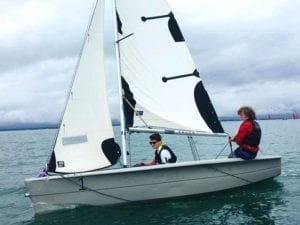
Learning to Sail FAQs
How Hard Is It to Learn How to Sail?
One of the most common questions is, how hard is it to learn how to sail? The difficulty of learning to sail varies depending on your prior experience and the type of sailing you want to pursue. For complete beginners, the learning curve can be steep at first, but with consistent practice and good instruction, most people find that they can get the hang of basic sailing techniques within a few weeks. The key is to start with the basics and gradually build your skills.
How Much Does It Cost to Learn to Sail in the UK?
Cost is another significant factor when considering how long does it take to learn to sail. The cost of learning to sail in the UK can vary depending on the type of course, the length of the course, and the sailing school you choose. For example, a basic RYA Start Yachting course might cost around £250-£300 for a weekend course. More advanced courses, such as the RYA Day Skipper, can cost between £600-£1,200, depending on whether they include accommodation and meals.
Is Sailing Hard Physically?
A common concern for beginners is whether sailing is physically demanding. The physical demands of sailing depend largely on the type of sailing you’re doing and the conditions. Dinghy sailing, for example, can be quite physically demanding, especially in strong winds, as it requires constant movement and balance. On the other hand, sailing a larger yacht is less physically demanding but still requires a good level of fitness, particularly when it comes to tasks like hoisting sails, handling lines, and moving around the boat. However, with time and practice, your body will adapt to the physical demands of sailing.
What Is the Hardest Thing About Sailing?
Every sailor might give a different answer to this question, but many would agree that one of the hardest things about sailing is mastering the art of sail trimming. Adjusting the sails to capture the wind efficiently requires a deep understanding of wind patterns, boat speed, and sail shape. It’s a skill that takes time to develop and can be challenging to master. However, once you get the hang of it, sail trimming can be incredibly rewarding and a key part of what makes sailing so enjoyable.
Can I Sail with No Experience?
Absolutely! You don’t need any prior experience to start learning to sail. Beginners can start with basic courses like the RYA Start Yachting or RYA Competent Crew courses. These courses are designed to introduce you to the fundamentals of sailing in a safe and structured environment. Many sailing schools, including UKSA, offer beginner-friendly courses that don’t require any previous sailing experience. So, if you’re wondering how long does it take to learn to sail as a complete novice, rest assured that with the right instruction, you’ll be on your way to becoming a confident sailor in no time.
Latest posts
